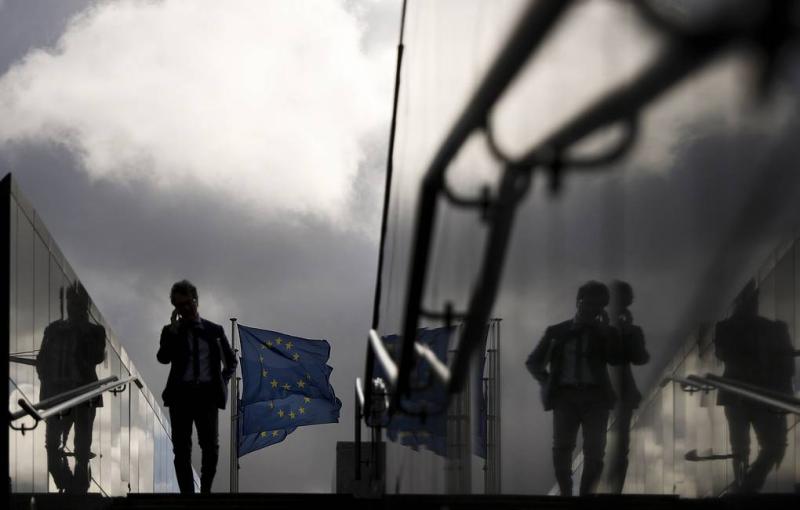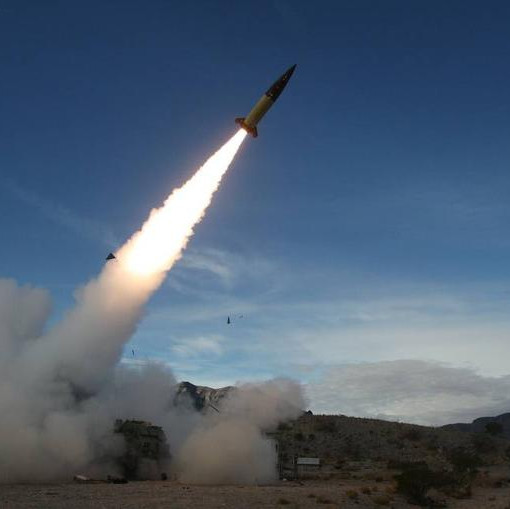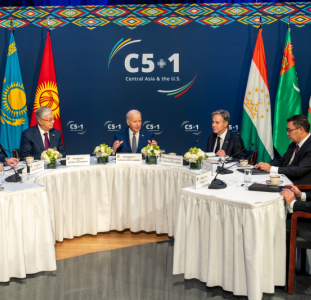
© AP Photo/Francisco Seco/TASS
Top stories from the Russian press on Tuesday, January 24th, prepared by TASS
The European Union has agreed to provide Ukraine with €500 mln in military aid, Estonia may impede Russian navigation in the Gulf of Finland, and Russia intends to increase cooperation with South Africa. These articles dominated the front pages of Russian newspapers on Tuesday.
Izvestia: EU to supply Ukraine with more military aid to the tune of €500 mln
The EU will contribute an additional €500 mln from the European Peace Fund to Ukraine: the association’s foreign ministers agreed on a new tranche at a meeting on January 23. The 10-point "peace plan" trotted out by Ukrainian President Vladimir Zelensky was also considered in Brussels. European ministers did not move forward on additional measures against Moscow, but instead addressed their willingness to seize Russian assets. The State Duma responded by telling Izvestia that lawsuits would likely ensue to unfreeze this money.
Meanwhile, the weapons supply from the EU has been put on hold. Germany's cautious delay on Leopard 2 supplies prevents the formation of a tank coalition. "National governments are responsible for all supply matters. This is what is causing contention. Nonetheless, all members of the association have stated unequivocally that they are ready to help Ukraine with whatever support is required," Director of the Center for European Information, Associate Professor at MGIMO Nikolay Topornin told Izvestia.
According to the European Commission (EC), member countries have frozen €300 bln in assets belonging to the Bank of Russia and around €20 bln in assets owned by Russian businessmen. However, there is no legal process in place to seize them and such measures have been frequently labeled as theft by Russia. "Lawsuits are being worked out to unfreeze our assets," Chairman of the State Duma Committee on the financial market Anatoly Aksakov told the newspaper.
Aside from European military support, the ministers that day addressed Vladimir Zelensky’s 10-point plan for the G20 summit. Mikhail Ulyanov, Russia's permanent envoy to international organizations in Vienna, noted that only the UN Security Council has the authority to establish international tribunals and Russia has the authority to veto there. With that in mind, German MEP Gunnar Beck told Izvestia that the peace plan could become the basis for negotiations, but only if Zelensky and the West are ready to compromise with Moscow.
Vedomosti: Estonia wants to complicate Gulf of Finland navigation for Russia
Taking its cue from Estonia, Latvia decided to downgrade its diplomatic relations with Russia, according to Latvian Foreign Minister Edgar Rinkevich. The Russian ambassador was ordered to leave Estonia by February 7 after Moscow had ordered Estonian Ambassador Margus Laidre to leave the Russian Federation by that same date. According to experts interviewed by Vedomosti, since there has been no political conversation between Russia and the Baltic countries for many years, the form of the diplomatic relations is finally matching the content.
This Baltic escalation has been heating up since the beginning of the year, Vedomosti writes. According to Foreign Minister Urmas Reinsalu, the Estonian government is now working on a legal position on an additional coastline "contiguous zone" in the Gulf of Finland within 24 nautical miles (44.4 km) of the country's territorial sea baseline. At the same time, the maritime boundaries of Estonia and Finland are formed in such a way that just a three-mile corridor of international waters remains between them in some regions.
According to Sergey Glandin, partner at the NSP legal company and an expert in international law, complications with the navigation arrangement in the Gulf of Finland are not evident for Russia and depend, among other things, on Helsinki's position. According to the expert, Estonia can theoretically proclaim this zone between it and Finland its contiguous zone and deploy its ships there using local laws. However, if Finland protests, Tallinn will be unable to entirely restrict Russian ships.
Kommersant: Russia finds partner in South Africa
Russian Foreign Minister Sergey Lavrov visited South Africa as part of laying the groundwork for the Russia-Africa summit set for July in St. Petersburg. He made it clear that this is one of the countries that wants to "cooperate honestly". Moscow is cultivating mechanisms independent of the West to work with such partners. The parties also discussed the trilateral decision by Russia, China and South Africa to conduct collaborative naval exercises during a press conference in Pretoria, which alarmed the United States, who is generally displeased with the mounting contacts between Russia and African countries, Kommersant writes.
South Africa is one of Russia’s five largest trading partners on the continent. In 2021, bilateral trade, according to the Russian Federal Customs Service, amounted to $1.139 bln. The Russian minister mentioned peaceful space, high technology, smart cities, and nuclear energy as promising areas of collaboration with South Africa. Pretoria is willing to collaborate, but the question is how to build a supply chain and financial services for collaborative projects in the face of Western sanctions imposed on Russia.
"There is a split in the South African establishment between the ruling ANC party and the opposition, which is fiercely against Russian-South African collaboration. There are fears that the country's frenetic anti-Russian media campaign may gradually tip the scales against Moscow. Nonetheless, for the time being, South Africa is interested in broadening its foreign relations, particularly through the BRICS," junior researcher at the Institute for International Studies at MGIMO Maya Nikolskaya told Kommersant.
The expert also noted that 2022 was generally not an easy year for Russian-African relations. African countries found themselves under tremendous pressure from the West.
However, Moscow still has great potential in Africa: Russia is a major grain exporter and in turn, "Moscow is interested in new sales markets, so building alternative value chains is in the interests of both parties," the expert said.
Nezavisimaya Gazeta: Tehran blackmails Europe over IRGC getting blacklisted
Iran has not ruled out abandoning the Nuclear Non-Proliferation Treaty in response to the European bureaucracy's willingness to label the Islamic Revolutionary Guard Corps (IRGC), one of the most powerful military-political organizations, as a terrorist organization. The issue is significant for Tehran because, when comparable US restrictions were imposed on the Corps in the past, one of its prominent generals, Qasem Soleimani, was killed. In addition, the rejection of the treaty is also expected to antagonize Iran's partners - Russia and China, Nezavisimaya Gazeta writes.
"Because the IRGC is an influential part of the Iranian state, including the organization in the list of terrorist groups puts the Islamic Republic itself outside the law in Europe," expert at the Russian International Affairs Council Nikita Smagin told the newspaper. Meanwhile, the expert emphasized that the inclusion of the Corps on the blacklists has solely symbolic importance.
"Iran has made similar threats before. There has been speculation on this in the past. But, just as before, I would not take it seriously.
Withdrawing from the Treaty closes the door not merely to talks with Europe," he explained. According to the analyst, rejecting the treaty is even more of a message against Russia and China, which would be upset by such measures just as much as the EU or the US.
"I would not expect Iran to take such a drastic step, given the growing importance of Russia and China in the current situation, when a return to the ‘nuclear deal’ appears unlikely in the foreseeable future," the analyst said.
Nezavisimaya Gazeta: US wants to oust Russia, Qatar from gas markets
The United States is ready to unleash its ambitions to become the global leader in liquefied natural gas (LNG) exports, setting its sights on launching projects with a total supply of 170 mln metric tons by 2027. US schemes to elbow Russia out of the European gas market as a whole have turned out to be a success, Nezavisimaya Gazeta writes. Today, the overland extensions of the former Nord Streams in Germany are already being readied to receive US gas. Russia intended to boost its own LNG production to 100 mln metric tons by 2035. However, in order to do so, it needs to overcome technological barriers for liquefying and transporting gas.
LNG remained the only type of fuel, and its supply from Russia to Europe had increased in 2022. The decline in Russian pipeline gas exports to the EU has led to the share of LNG in Russian gas exports increasing to 25%. At the end of the year, Russia ranked third in LNG supplies to Europe, trailing the US and Qatar.
According to analysts, the next two or three years could be decisive for Russia if it even wants to return to the European market in the same volumes. LNG may face Western sanctions at some point, but it is in high demand around the world, and its distribution mechanism is far more flexible, so sales should be unaffected, experts believe.
"The question is how quickly Russia will be able to replace imports in production for large-tonnage gas liquefaction and tanker manufacture. Our company estimates that replacing key LNG technologies will take three to four years. However, Russia's return to the European market will be determined by the next two years," leading expert at the Financial University and the National Energy Security Fund Stanislav Mitrakhovich told the newspaper.









